| Listing 1 - 10 of 123 | << page >> |
Sort by
|
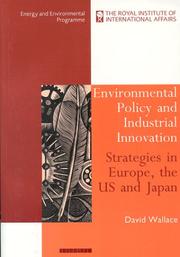
ISBN: 185383288X Year: 1995 Publisher: London The Royal Institute of International Affairs
Abstract | Keywords | Export | Availability | Bookmark
 Loading...
Loading...Choose an application
- Reference Manager
- EndNote
- RefWorks (Direct export to RefWorks)
Environmental policy --- Technological innovations --- Economic aspects --- Europe --- Japan --- United States --- Organization for economic Co-operation and Development

ISBN: 1853833401 Year: 1996 Publisher: London Earthscan Publications
Abstract | Keywords | Export | Availability | Bookmark
 Loading...
Loading...Choose an application
- Reference Manager
- EndNote
- RefWorks (Direct export to RefWorks)
Croissance verte --- Development [Sustainable ] --- Duurzame ontwikkeling --- Développement durable --- Développement soutenable --- Développement viable --- Développement éco-responsable --- Développement économique durable --- ESD (Ecologically sustainable development) --- Ecologically sustainable development --- Economic development [Sustainable ] --- Economic sustainability --- Industrialisation --- Industrialisering --- Industrialization --- Ontwikkeling [Duurzame ] --- Smart growth --- Sustainable development --- Sustainable economic development --- Écodéveloppement --- Économie durable --- Économie soutenable --- Économie verte
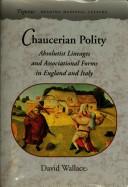
ISBN: 0804727244 Year: 1997 Volume: *5 Publisher: Stanford, Calif Stanford University Press
Abstract | Keywords | Export | Availability | Bookmark
 Loading...
Loading...Choose an application
- Reference Manager
- EndNote
- RefWorks (Direct export to RefWorks)
Beschaving [Middeleeuwse ] in de literatuur --- Civilisation médiévale dans la littérature --- Civilization [Medieval ] in literature --- Constitutional history [Medieval] --- Constitutionele geschiedenis van de middeleeuwen --- Despotism in literature --- Despotisme dans la littérature --- Despotisme in de literatuur --- Histoire constitutionnelle du moyen âge --- Italie dans la littérature --- Italië in de literatuur --- Italy in literature --- Medieval civilization in literature --- Middeleeuwse beschaving in de literatuur --- Chaucer, Geoffrey --- Political and social views --- Political poetry [English ] --- History and criticism --- Knowledge --- Italy --- Politics and literature --- England --- History --- English poetry --- Italian influences --- CHAUCER (GEOFFREY), d. 1400 --- POLITICAL POETRY, ENGLISH --- POLITICS AND LITERATURE --- MEDIEVAL CIVILIZATION --- ENGLISH POETRY --- POLITICAL AND SOCIAL VIEWS --- CANTERBURY TALES --- GREAT BRITAIN --- ITALIAN INFLUENCES
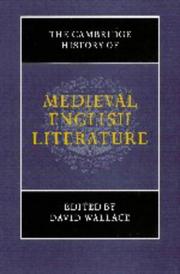
ISBN: 0521444209 9780521444200 9781139053624 9780521890465 Year: 1999 Publisher: Cambridge Cambridge University Press
Abstract | Keywords | Export | Availability | Bookmark
 Loading...
Loading...Choose an application
- Reference Manager
- EndNote
- RefWorks (Direct export to RefWorks)
This was the first full-scale history of medieval English literature for nearly a century. Thirty-three distinguished contributors offer a collaborative account of literature composed or transmitted in England, Wales, Ireland and Scotland between the Norman conquest and the death of Henry VIII in 1547. The volume has five sections: 'After the Norman Conquest'; 'Writing in the British Isles'; 'Institutional Productions'; 'After the Black Death' and 'Before the Reformation'. It provides information on a vast range of literary texts and the conditions of their production and reception, which will serve both specialists and general readers, and also contains a chronology, full bibliography and a detailed index. This book offers an extensive and vibrant account of the medieval literatures so drastically reconfigured in Tudor England. It will thus prove essential reading for scholars of the Renaissance as well as medievalists, and for historians as well as literary specialists.
English literature --- Littérature anglaise --- History and criticism. --- Histoire et critique --- Great Britain --- Grande-Bretagne --- Intellectual life --- Vie intellectuelle --- Bibliography --- History and criticism --- Civilisation médiévale --- Dans la littérature --- Littérature anglaise --- Dans la littérature. --- Histoire et critique. --- English literature - Middle English, 1100-1500 - Bibliography --- English literature - Early modern, 1500-1700 - History and criticism --- Great Britain - Intellectual life - 1066-1485 --- Great Britain - Intellectual life - 16th century --- Civilisation médiévale --- Dans la littérature.
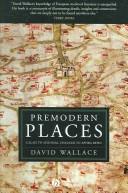
ISBN: 1405113936 9781405113939 9781405151528 1405151528 Year: 2006 Publisher: Malden Oxford Victoria : Blackwell,
Abstract | Keywords | Export | Availability | Bookmark
 Loading...
Loading...Choose an application
- Reference Manager
- EndNote
- RefWorks (Direct export to RefWorks)
This book recovers places in the mental mapping of medieval and Renaissance writers, from Chaucer to Aphra Behn. Beginning with Calais, peopled by the English from 1347 to 1558, and ending with Surinam, traded away for Manhattan in 1667, this well-illustrated book recreates the distinctive cultural life of a range of locations: from Flanders which led the world in technological innovations; to Somerset, which provided a fitting home for Dante; to the Canaries (the Fortunate Islands), which formed the limits of western dreaming. This book's exploration of premodern places features fascinating vignettes, such as an English merchant learning love songs in Calais, coupled with insights into broader economic narratives of political, technological, religious, and economic change. In particular, it provides long geneaologies of blackness and whiteness, race and slavery, in the premodern world.
English literature --- Geography in literature --- Topography in literature --- Foreign influences --- History and criticism --- Geography in literature. --- Foreign influences. --- History and criticism. --- Littérature anglaise --- Géographie --- Influence étrangère --- 1100-1500 (moyen anglais) --- Histoire et critique --- 16e siècle --- 17e siècle --- Dans la littérature
Book
ISBN: 9780198814320 0198814321 Year: 2021 Volume: 668 Publisher: Oxford: Oxford university press,
Abstract | Keywords | Export | Availability | Bookmark
 Loading...
Loading...Choose an application
- Reference Manager
- EndNote
- RefWorks (Direct export to RefWorks)
Philosophy of physics is concerned with the deepest theories of modern physics - notably quantum theory, our theories of space, time and symmetry, and thermal physics - and their strange, even bizarre conceptual implications. A deeper understanding of these theories helps both physics, through pointing the way to new theories and new applications, and philosophy, through seeing how our worldview has to change in the light of what we learn from physics. This Very Short Introduction explores the core topics in philosophy of physics through three key themes. The first - the nature of space, time, and motion - begins by considering the philosophical puzzles that led Isaac Newton to propose the existence of absolute space, and then discusses how those puzzles change - but do not disappear - in the context of the revolutions in our understanding of space and time that came first from special, and then from general, relativity. The second - the emergence of irreversible behavior in statistical mechanics - considers how the microscopic laws of physics, which know of no distinction between past and future, can be compatible with the melting of ice, the cooling of coffee, the passing of youth, and all the other ways in which the large-scale world distinguishes past from future. The last section discusses quantum theory - the foundation of most of modern physics, yet mysterious to this day. It explains just why quantum theory is so difficult to make sense of, how we might nonetheless attempt to do it, and why the question has been highly relevant to the development of physics, and continues to be so.
Physics --- Physique --- Philosophy. --- Philosophie.
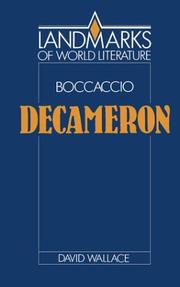
ISBN: 0521381827 0521388511 1139166360 9781139166362 9780521381826 9780521388511 Year: 1991 Publisher: Cambridge Cambridge University Press
Abstract | Keywords | Export | Availability | Bookmark
 Loading...
Loading...Choose an application
- Reference Manager
- EndNote
- RefWorks (Direct export to RefWorks)
In Boccaccio's innovative text, ten young people leave Florence to escape the Black Death of 1348, and organize their collective life in the countryside through the pleasure and discipline of story-telling. David Wallace guides the reader through their one hundred novelle, which explore both new and familiar conflicts from private and public spheres of life with unprecedented subtlety, urgency and humour. He emphasises the relationship between Decameron and the precocious vitality of Florentine culture in Boccaccio's time. He also discusses gender issues and the influence of the text particularly on Chaucer and the novel.
Boccaccio, Giovanni --- Arts and Humanities --- Literature --- Boccaccio, Giovanni,
Book
Year: 1909 Publisher: New York, N.Y.: McGraw-Hill,
Abstract | Keywords | Export | Availability | Bookmark
 Loading...
Loading...Choose an application
- Reference Manager
- EndNote
- RefWorks (Direct export to RefWorks)
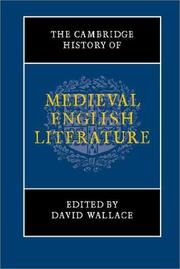
ISBN: 0521890462 Year: 2002 Publisher: Cambridge Cambridge University press
Abstract | Keywords | Export | Availability | Bookmark
 Loading...
Loading...Choose an application
- Reference Manager
- EndNote
- RefWorks (Direct export to RefWorks)
English literature --- -English literature --- -History and criticism --- Bibliography --- Great Britain --- -Great Britain --- -Intellectual life --- -Intellectual life -
Book
ISBN: 0192527258 019252724X 9780192527240 9780198805069 0198805063 Year: 2017 Publisher: Oxford, United Kingdom
Abstract | Keywords | Export | Availability | Bookmark
 Loading...
Loading...Choose an application
- Reference Manager
- EndNote
- RefWorks (Direct export to RefWorks)
Geoffrey Chaucer is today enjoying a global renaissance. Why do poets, translators, and performers, from the mountains of Iran to the islands of Japan, find him so inspiring? In part this is down to the absolutely ground-breaking character of Chaucer's work. Not for nothing was he known as the Father of English Literature; his works were not just literary adventures, but also the first ever attempt to convince the world that poetry, science, tragedy, and astrology could all be explored through English, at a time when English writing commanded no prestige at a European level. Born in noisy dockside London, and then later a royal esquire, Chaucer was recognized by Westminster as a wily civil servant, a customs officer, but not as a poet. Only much later did his Westminister Abbey burial place became Poets' Corner, a national shrine. From Shakespeare to Sylvia Plath, writers have revelled in Chaucer's unique expressive range: high tragedy and barnyard farce; religious allegory and sex up a pear tree; farts and the music of the heavenly spheres. Today new performers are imagining new Chaucers across the world. -- from dust jacket.
| Listing 1 - 10 of 123 | << page >> |
Sort by
|

 Search
Search Feedback
Feedback About UniCat
About UniCat  Help
Help News
News